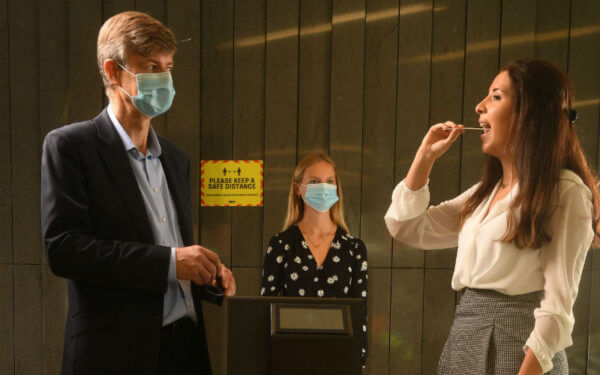Today’s short blog post looks at how a single newspaper article derailed a company’s attempt to secure positive media coverage for its 20 second Covid test. It shows how traditional media still has the resources and bite to hold organisations accountable for the claims they make and how important it is to be accurate and truthful when writing press releases. It is also a masterclass in journalistic writing.
On the 17th September, the Financial Times published an article questioning the claims of a tiny tech company, iAbra, relating to its invention of a 20-second Covid saliva test in a box using AI and digital microscopes. The company’s press release the week before about its Virolens test had generated unquestioning media coverage mainly in trade press; the company poised to manufacture the device saw its shareprice soar 40%.
Within 24 hours of the FT picking it to pieces, iAbra rowed back on its hubris, the Daily Mail was talking about iAbra’s unjustified bragging and the manufacturer’s shareprice lost almost all its gains. The digital archive that is the internet will keep that a problem for a long time to come.
It all has echoes of Elizabeth Holmes and her company Theranos (the young, American entrepreneur who claimed to have revolutionised blood testing by developing methods using just a finger prick’s worth of blood. A tenacious investigation by a journalist from the Wall Street Journal showed she hadn’t; criminal charges followed and the once $9bn-valued company was dissolved). I’m surprised the FT didn’t mention it!
The article’s headline “Is the company with a 20-second coronavirus test for real?” sets the tone. It then writes of an “obscure” company of four employees in a village 40 miles north of London that seems to have done what bigger and richer companies have failed to do – develop a rapid covid test process. Admiration or sarcasm?
It later adds a detail about only one of the employees having a science degree of any sort. You can read the line: “a remarkable testament to the ingenuity of a man with no formal scientific education” as more admiration or as more sarcasm.
The line that “the early excitement also shows people’s collective desperation for a silver bullet and willingness to suspend disbelief” tells me that the paper has a sceptical view of the company. Was that what the journalist intended? Surely not!
The article then identifies what it maintains are errors and exaggerated claims made by iAbra:
- Neither Heathrow airport nor Leidos, a huge US software company, which were identified in the press release as the test’s “launch customers” had actually placed any orders for the test.
- When challenged by the FT, Heathrow Airport backtracked on its quote in the press release that the test was “potentially more accurate” than existing swab tests saying “That type of statement would have been provided to any of the three suppliers that we did the trial with . . . It’s not that we’re endorsing iAbra specifically.”
- The claim that “the Virolens system has a 99.8% sensitivity and 96.7% specificity, based on the results of an internal in vitro validation study, designed by the University of Bristol” was apparently not as it seemed. Academics at Bristol University told the FT that they were not involved in any study that tested the sensitivity and specificity of the testing device, merely providing samples of the Covid-19 virus to the company and without being in any way involved in any validation.
- The article pointed out that the test has yet to receive any external regulatory validation nor had there been any oversight of the underlying data for the company’s claims for the test’s accuracy.
- The FT reported that: “US chip group Intel, which also partnered iAbra on the creation of the AI engine for the testing technology, posted an article about the test on its website on Thursday that has since been removed. It did not provide a comment on why the article had disappeared.”
- Naturally the FT reported dissenting opinion from eminent people: a scientist who criticised the scientific information provided by the company as a “mishmash of different things”; another who was concerned by the wording of the company’s release which suggested that the virus was “another cell” which therefore “showed either carelessness or frightening ignorance”; and a professor quoted saying “we are in a pandemic, people are dying from the disease, and a company decides that it is reasonable to mislead us all to make their test look like the best thing available”.
- And in a nice touch, the FT discovered how “the credentials of the technology are further muddied by apparent connections to an organisation [prepared to finance the distribution of the test machine] that spent decades working on hoaxes about the fictional monster Big Foot”.
The FT noted how the company founder pleaded “if we made a slight, slight miswording of [our release], I apologise for everybody” and how any misrepresentation in the press release had not been “done with any malice”.
Within hours of the article, iAbra was backtracking: “It has the potential to make a significant difference to COVID testing, but it is currently embarking on functional and clinical trials and it wouldn’t be appropriate to comment further until the results of those are known. We are poised to roll out once we receive the requisite approval.” Not quite the original ‘by the end of January, we would be able to test everyone in Europe per month’ claim.
I wonder if we will hear of iAbra’s Virolens® test ever again?

